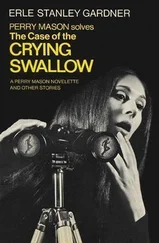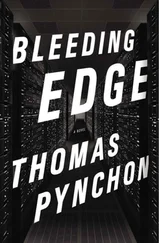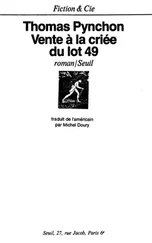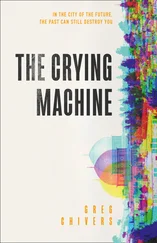"Baby," she said, helpless, knowing of nothing she could do for this, and afraid for him.
He put a little clear plastic bottle on the table between them. She stared at the pills in it, and then understood. "That's LSD?" she said. Mucho smiled back. "Where'd you get it?" Knowing.
"Hilarius. He broadened his program to include husbands."
"Look then," Oedipa said, trying to be businesslike, "how long has it been, that you've been on this?"
He honestly couldn't remember.
"But there may be a chance you're not addicted yet."
"Oed," looking at her puzzled, "you don't get addicted. It's not like you're some hophead. You take it because it's good. Because you hear and see things, even smell them, taste like you never could. Because the world is so abundant. No end to it, baby. You're an antenna, sending your pattern out across a million lives a night, and they're your lives too." He had this patient, motherly look now. Oedipa wanted to hit him in the mouth. "The songs, it's not just that they say something, they are something, in the pure sound. Something new. And my dreams have changed."
"Oh, goodo." Flipping her hair a couple times, furious, "No nightmares any more? Fine. So your latest little friend, whoever she is, she really made out. At that age, you know, they need all the sleep they can get."
"There's no girl, Oed. Let me tell you. The bad dream that I used to have all the time, about the car lot, remember that? I could never even tell you about it. But I can now. It doesn't bother me any more. It was only that sign in the lot, that's what scared me. In the dream I'd be going about a normal day's business and suddenly, with no warning, there'd be the sign. We were a member of the National Automobile Dealers' Association. N.A.D.A. Just this creaking metal sign that said nada, nada, against the blue sky. I used to wake up hollering."
She remembered. Now he would never be spooked again, not as long as he had the pills. She could not quite get it into her head that the day she'd left him for San Narciso was the day she'd seen Mucho for the last time. So much of him already had dissipated.
"Oh, listen," he was saying, "Oed, dig." But she couldn't even tell what the tune was.
When it was time for him to go back to the station, he nodded toward the pills. "You could have those."
She shook her head no.
"You're going back to San Narciso?"
"Tonight, yes."
"But the cops."
"I'll be a fugitive." Later she couldn't remember if they'd said anything else. At the station they kissed goodbye, all of them. As Mucho walked away he was whistling something complicated, twelve-tone. Oedipa sat with her forehead resting on the steering wheel and remembered that she hadn't asked him about the Trys-tero cancellation on his letter. But by then it was too late to make any difference.
WHEN she got back to Echo Courts, she found Miles, Dean, Serge and Leonard arranged around and on the diving board at the end of the swimming pool with all their instruments, so composed and motionless that some photographer, hidden from Oedipa, might have been shooting them for an album illustration.
"What's happening?" said Oedipa.
"Your young man," replied Miles, "Metzger, really put it to Serge, our counter-tenor. The lad is crackers with grief."
"He's right, missus," said Serge. "I even wrote a song about it, whose arrangement features none other than me, and it goes like this."
SERGE'S SONG
What chance has a lonely surfer boy
For the love of a surfer chick,
With all these Humbert Humbert cats
Coming on so big and sick?
For me, my baby was a. woman,
For him she's just another nymphet;
Why did they run around, why did she put me down,
And get me so upset?
Well, as long as she's gone away-yay,
I've had to find somebody new,
And the older generation
Has taught me what to do-
I had a date last night with an eight-year-old,
And she's a swinger just like me,
So you can find us any night up on the football field,
In back of P.S. 33 (oh, yeah),
And it's as groovy as it can be.
"You're trying to tell me something," said Oedipa.
They gave it to her then in prose. Metzger and Serge's chick had run off to Nevada, to get married. Serge, on close questioning, admitted the bit about the eight-year-old was so far only imaginary, but that he was hanging diligently around playgrounds and should have some news for them any day. On top of the TV set in her room Metzger had left a note telling her not to worry about the estate, that he'd turned over his execu-torship to somebody at Warpe, Wistfull, Kubitschek and McMingus, and they should be in touch with her, and it was all squared with the probate court also. No word to recall that Oedipa and Metzger had ever been more than co-executors.
Which must mean, thought Oedipa, that that's all we were. She should have felt more classically scorned, but had other things on her mind. First thing after unpacking she was on the horn to Randolph Driblette, the director. After about ten rings an elderly lady answered. "I'm sorry, we've nothing to say."
"Well who's this," Oedipa said.
Sigh. "This is his mother. There'll be a statement at noon tomorrow. Our lawyer will read it." She hung up. Now what the hell, Oedipa wondered: what had happened to Driblette? She decided to call later. She found Professor Emory Bortz's number in the book and had better luck. A wife named Grace answered, backed by a group of children. "He's pouring a patio," she told Oedipa. "It's a highly organized joke that's been going on since about April. He sits in the sun, drinks beer with students, lobs beer bottles at seagulls. You'd better talk to him before it gets that far. Maxine, why don't you throw that at your brother, he's more mobile than I am. Did you know Emory's done a new edition of Wharfinger? It'll be out-" but the date was obliterated by a great crash, maniacal childish laughter, high-pitched squeals. "Oh, God. Have you ever met an infanticide? Come on over, it may be your only chance."
Oedipa showered, put on a sweater, skirt and sneakers, wrapped her hair in a studentlike twist, went easy on the makeup. Recognizing with a vague sense of dread that it was not a matter of Bortz's response, or Grace's, but of The Trystero's.
Driving over she passed by Zapf's Used Books, and was alarmed to find a pile of charred rubble where the bookstore only a week ago had Stood. There was still the smell of burnt leather. She stopped and went into the government surplus outlet next door. The owner informed her that Zapf, the damn fool, has set fire to his own store for the insurance. "Any kind of a wind," snarled this worthy, "it would have taken me with it. They only put up this complex here to last five years anyway. But could Zapf wait? Books." You had the feeling that it was only his good upbringing kept him from spitting. "You want to sell something used," he advised Oedipa, "find out what there's a demand for. This season now it's your rifles. Fella was in just this forenoon, bought two hundred for his drill team. I could've sold him two hundred of the swastika armbands too, only I was short, dammit."
"Government surplus swastikas?" Oedipa said. "Hell no." He gave her an insider's wink. "Got this little factory down outside of San Diego," he told her, "got a dozen of your niggers, say, they can sure turn them old armbands out. You'd be amazed how that little number's selling. I took some space in a couple of the girlie magazines, and I had to hire two extra niggers last week just to take care of the mail." "What's your name?" Oedipa said. "Winthrop Tremaine," replied the spirited entrepreneur, "Winner, for short. Listen, now we're getting up an arrangement with one of the big ready-to-wear outfits in L.A. to see how SS uniforms go for the fall. We're working it in with the back-to-school campaign, lot of 37 longs, you know, teenage kid sizes. Next season we may go all the way and get out a modified version for the ladies. How would that strike you?"
Читать дальше












